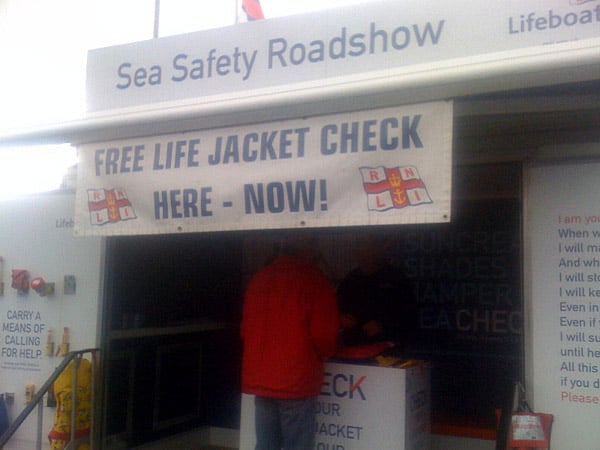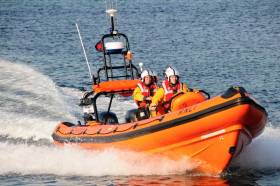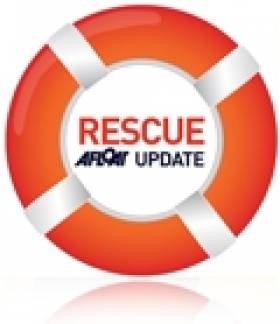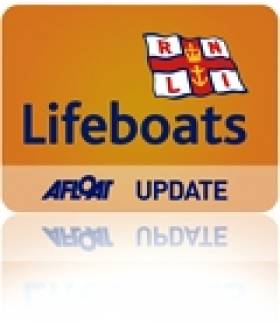Displaying items by tag: Sea Safety
#Rescue - Bundoran RNLI is reminding anyone planning a trip to the coast this summer to be mindful of the dangers of rip currents that can quickly sweep you out to sea.
The advice comes as Bundoran’s volunteer lifeboat crew launched yesterday morning (Saturday 15 July) following reports of several people in difficulty in the sea off Tullan Strand.
It emerged that a group of GAA footballers had been training on the beach and went swimming to cool down following their session.
The strong currents at Tullan soon began to carry a number of them out to sea and into the rocks.
Concerned onlookers immediately called the Irish Coast Guard, and within minutes both the inshore lifeboat from Bundoran and the Sligo-based Rescue 118 helicopter were at the scene.
Meanwhile, a group of quick-thinking surfers — one of whom is crew member with Bundoran RNLI — entered the water on boards and helped the footballers to safety.
On arrival, the lifeboat ensured that all casualties were out of the water, while Rescue 118 landed on Tullan Strand and also made sure that everyone was accounted for.
The lifeboat crew trained in first aid assisted eight of the players, some who were bruised and some who had swallowed sea water before ambulances arrived.
A number of the casualties were taken to Sligo University Hospital as a precaution.
Following the incident, Bundoran RNLI helm James Cassidy reminded anyone planning a trip to the area of the potential dangers.
“Thankfully everyone is safe this afternoon and we would like to wish the group well following what must have been a frightening experience,” he said.
“We would remind locals and visitors alike that Tullan Strand and particularly the area along the cliffs is notorious for rip currents and under currents and is really not suitable for swimming.
“Rips are strong currents running out to sea which can catch even the most experienced beachgoers out. They can take you from the shallows very quickly and leave you out of your depth.”
Cassidy said Bundoran’s main beach is supervised by lifeguards all summer long and provides the best option for safe, supervised swimming during the summer period.
“Should you get caught in a rip, the best advice is to stay calm and don’t panic,” he added. “If you can stand, wade. Don’t try to swim. If you have an inflatable or board, keep hold of it to help you float. Raise your hand and shout for help loudly.
“Don’t swim directly against the rip or you will get exhausted. Swim parallel to the beach until free of the rip, then make for shore.”
Further sea safety advice can be found on www.respectthewater.com.
#safetyonthewater – The Irish Maritime Administration (IMA), the Government's new wing to deal with maritime affairs, is inviting submissions from all interested parties on the new Maritime Safety Strategy, Sea Change – Building a New Maritime Safety Culture, which is currently being developed.
The IMA says the new Maritime Safety Strategy will focus on building a culture of safety and will target the main causes of casualties in the maritime sector.
Minister for Transport, Tourism & Sport Leo Varadkar will formally launch the consultation process this morning at the Coast Guard building at the Department of Transport, Tourism & Sport on Leeson Lane.
It will cover all types of craft being used for any purpose on Irish coastal or inland waters, including recreational craft, fishing vessels, passenger vessels and cargo vessels.
Significantly, it has a focus on recreational craft given the spike in call outs over the past few summers.
The public consultation document, which provides an outline of the key issues, is available on the Department’s website or by telephoning 01-6783454.
The IMA says that submissions received will not be responded to on an individual basis, but they will be taken into consideration by the IMA in the preparation of the new Maritime Safety Strategy. Copies of all submissions received will also be published in full on the Department’s website.
Written submissions should sent by email to [email protected] or by post to the address below by Friday 29th August 2014 at the latest to Maritime Safety Strategy Consultation, Maritime Services Division, Irish Maritime Administration (IMA), Department of Transport, Tourism and Sport, Leeson Lane, Dublin 2
Free Lifejacket Check in Dun Laoghaire Today
With the summer boating season coming to a close, the RNLI’s Sea Safety team is back in Dun Laoghaire this morning and people who use the water are being invited to get their lifejackets checked out for free and find out more about this vital piece of boating kit.
It's an ideal opportunity to get the jackets checked before putting them away for the winter or indeed before the start of the different winter series on the Bay.
The RNLI carried out a similar service during the summer and on that occasion Over 90% of lifejackets tested at Ireland's two biggest sailing centres failed the simple checks.
From 91 jackets tested in Cork and Dublin, 83 failed the free inspection.
The annual Lifejacket check service carried out by the institute was only taken up by 40 sailors from an estimated 1,000 competing crews at Cork week. 35 failed the test.
The RNLI lifejacket clinic took place yesterday at Dun Laoghaire marina and takes place again today.
The RNLI’s lifejacket campaign, first launched in June 2007, aims to encourage all who go to sea in their leisure time to always put their lifejackets on when going to sea, and then decide when (if at all) to take it off.

RNLI Divisional Sea Safety Manager, Nicola Davies, explains:
‘A lifejacket is useless unless worn, if it is worn incorrectly or if it is not in full working order. It’s much safer to get into the habit of wearing a lifejacket at all times when afloat, because it means you’ll be familiar with your particular lifejacket and how to operate it should an emergency situation unfold. In the summer months when boat owners may take family and friends who don’t often go afloat, it’s even more crucial to ensure that all on board, including babies and children, are wearing a well-fitted lifejacket.
‘A correctly fitting lifejacket will keep you afloat so that, should you end up in the water, you have time to overcome the initial shock and you can begin to think about survival. It will also keep your airways clear of the water, which is absolutely crucial because it only takes just a cup full of water in the lungs to make survival difficult and just over a litre to drown. A lifejacket also buys you time, this will allow for the search and rescue services to come to your aid. Our advice is not meant to spoil the fun of water users, but it is founded on the years of experience of RNLI lifeboat crew who know how unpredictable the weather can be and how quickly things can go wrong at sea.’
Lifejackets should not only be worn, but they need regular maintenance checks too. They should be stored in a dry, well-aired area when not in use. RNLI Sea Safety managers and volunteers around the coast of the UK and Ireland found that almost 35 per cent of lifejackets they’ve looked at during RNLI Sea Checks would, in their opinion, fail to operate.
Related Safety posts
RNLI Lifeboats in Ireland
Safety News
Rescue News from RNLI Lifeboats in Ireland
Coast Guard News from Ireland
Water Safety News from Ireland
Marine Casualty Investigation Board News
Marine Warnings
































































